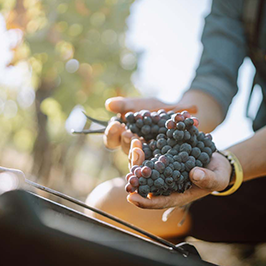Ceux qui aiment les vins hauts en couleur, les vins avec une belle mâche, les vins qui grandissent en beauté et saveurs, sous la baguette magique des années, ceux-là peuvent se réjouir.
– 38% Chardonnay.
– 27% Petit Manseng (origine des bois : Charles Hours – Béarn).
– 18% Viognier (origine des bois : Georges Vernay – Condrieu).
– 17% variétés rares : Chenin Blanc, Marsanne, Roussanne, Petit Courbu, Muscat Petit grain, Muscat d’Alexandrie, Gros Manseng, Semillon (France).
L’année 2001 commence en fanfares précoces, sortie énorme, belle floraison et nouaison parfaite en avance de 15 jours ; des pluies assez régulières pendant le premier semestre, jusqu’à fin juillet. Le vent du nord se lève à la mi-août, et ne tombera que le 20 septembre. Presque 6 semaines de brise du Nord qui va concentrer le jus, les sucres et les arômes.
Macération pelliculaire pendant 5 à 7 jours, fermentation en cuve inox.
Par le génie du vent du Nord, une petite récolte mais d’une concentration énorme qui fait penser aux millésimes 1980 et 1982 !

Les deux vies des vins blancs Mas de Daumas Gassac
Dans une cave fraîche (14-16°C) et humide, tous peuvent attendre de nombreuses années sans crainte, même les plus anciens.
Par contre, une cave trop chaude accélèrera le processus de vieillissement des vins.
Première vie
Fraîcheur et fruité des premières années. À déguster dans les trois premières années si vous appréciez les merveilleuses saveurs fruitées. Vous pouvez boire nos blancs, aussi bien à l’apéritif, que pendant le repas, accompagnant presque tous les plats.
Deuxième vie
Un vin différent apparaît entre la troisième et la sixième année ! Le fruit s’efface, évoluant vers des saveurs de “Jerez” et de vieux “Sauternes”, des
saveurs “oxydatives” d’une grande finesse.
Si vous ne cherchez pas ces notes paradoxales, surprenantes mais savoureuses, nous vous conseillons de déguster le Mas de Daumas Gassac Blanc dans les deux premières années.

* INSCRIVEZ-VOUS AUX VENDANGES 2025 *
Nous recherchons actuellement des personnes motivées qui seraient heureuses de nous rejoindre pour vivre l’expérience des vendanges au Mas !